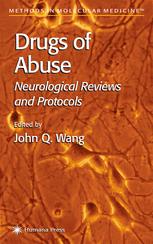

Most ebook files are in PDF format, so you can easily read them using various software such as Foxit Reader or directly on the Google Chrome browser.
Some ebook files are released by publishers in other formats such as .awz, .mobi, .epub, .fb2, etc. You may need to install specific software to read these formats on mobile/PC, such as Calibre.
Please read the tutorial at this link: https://ebookbell.com/faq
We offer FREE conversion to the popular formats you request; however, this may take some time. Therefore, right after payment, please email us, and we will try to provide the service as quickly as possible.
For some exceptional file formats or broken links (if any), please refrain from opening any disputes. Instead, email us first, and we will try to assist within a maximum of 6 hours.
EbookBell Team

0.0
0 reviewsNew molecular technologies have transformed our understanding of the neurological impact of drugs of abuse and opened many new possibilities for research. In Drugs of Abuse: Neurological Reviews and Protocols, leading scientists from all over the world review these novel research areas and provide a cutting-edge collection of updated and core techniques for the neurological study of drugs of abuse. Described in step-by-step detail, these readily reproducible protocols cover a wide variety of coherent methods for gathering information on quantitative changes in protein and mRNA at both tissue and cellular levels. There are various methods for detecting single and multiple alterations in single and multiple gene expression, for analyzing the functional roles of genes and proteins, for studying the release kinetics of striatal dopamine, and for the quantitative measurement of such neurotransmitters as acetylcholine. Additional methods are provided for primary neural cell culture preparation, for an immunohistochemical method to examine cellular proliferation and differentiation, and for a culture method to grow viable neural progenitors. All contributors have considerable experience with the protocols covered, and each protocol has been thoroughly tried and successfully tested in the laboratory. Helpful notes for each method discuss tricks-of-the-trade, pitfalls to avoid, and troubleshooting.
State-of-the-art and highly practical, Drugs of Abuse: Neurological Reviews and Protocols offers insightful reviews of key current topics and a core collection of readily reproducible techniques essential for any neurobiological laboratory carrying out either basic analyses or seeking novel research approaches.